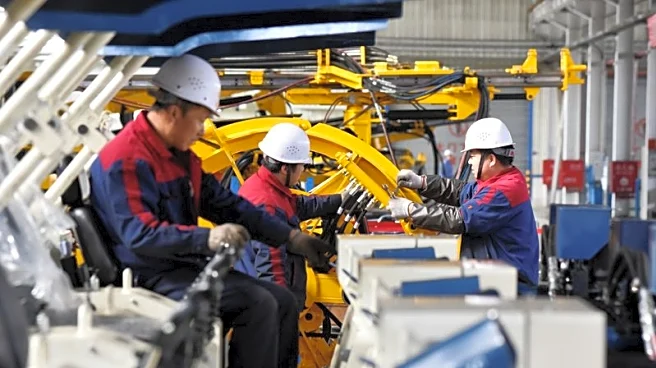BEIJING (Reuters) - China's factory output and retail sales missed expectations in August, keeping alive calls for further stimulus to shore up growth in the world's second-largest economy, which faces weak consumption and external risks.
Industrial output grew 5.2% year-on-year, National Bureau of Statistics data showed on Monday, slowing from the 5.7% increase the previous month and missing forecasts of 5.7% growth in a Reuters poll.
Retail sales, a gauge of consumption, expanded 3.4% in August after
rising 3.7% in July, missing forecasts of 3.9% growth.
Authorities are relying on manufacturers to tap new markets to offset U.S. President Donald Trump's erratic trade policy and depressed domestic demand, in a bid to meet Beijing's annual growth target of "around 5%".
The Chinese economy has been in the doldrums since momentum waned during the COVID-19 pandemic and a government campaign to rein in speculation and over-leverage sent the property sector into a years-long slump.
New home prices fell 0.3% in August from the previous month and 2.5% on an annual basis, separate official data showed, with the property market a persistent drag on growth.
Chinese households, which saw their wealth shrink in the real estate downturn, have tightened their purse strings while business confidence has faltered, dampening the job market.
Goods exports, a major driver for the manufacturing powerhouse, recorded the slowest growth in six months in August as producers on both sides of the Pacific watch to see if the world's two largest economies can navigate a path beyond their current tariff truce.
Chinese factory owners' profits have been squeezed by a years-long producer price downturn, while manufacturing activity has been hit by extreme weather over the summer, which was the hottest since 1961 and compounded by the longest rainy season for the same period.
Fixed asset investment grew 0.5% in the first eight months compared with the same period last year, versus an expected 1.4% increase and a 1.6% expansion in the January-to-July period.
Zheng Shanjie, head of China's state planner, said last week that Beijing would make full use of fiscal and monetary policies and improve its policy toolkit to help achieve annual economic targets.
He also pledged to carry out regular policy research and preparation and called for fast-tracking the rollout of new financial instruments in the second half of the year.
(Reporting by Kevin Yao, Joe Cash and Yukun Zhang; Editing by Sam Holmes)















